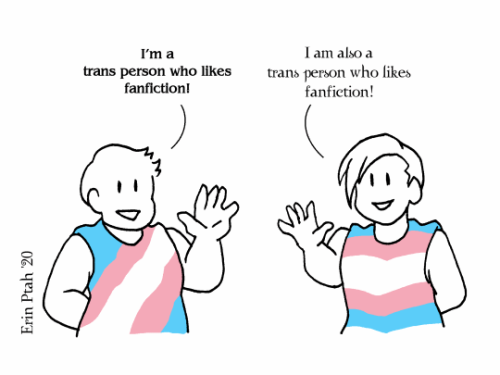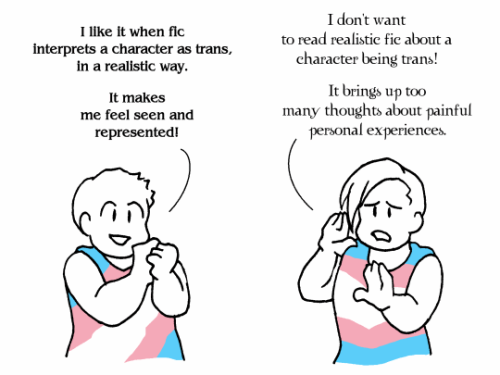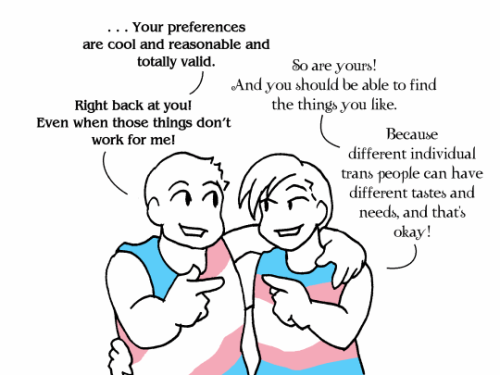#nuance is important
Okay, granted, it’s been a while since I’ve seen “all trans readers like one kind of fic, and no trans readers ever like another kind of fic, so it is Transphobia when you write the Wrong Kind.”
…but it hasn’tbeen that long since I’ve seen someone quietly wonder if they’re a Bad Trans Person for having preferences.
So it’s never a bad time to say: different people have different needs, and it’s okay to be fulfilled by different kinds of stories!
(heck, the sameperson might have different needs at different points in their own life, and that’s okay too)
I am both of these trans people
Post link
i’m here for the discussion, not the discourse (a manifesto)
In my FAQ I mention that ‘despite running a blog that talks a lot about anti-shipping, I try to ignore anti-shippers.’
Of course, I don’t actually ignore anti-shippers. I read their posts regularly and think about what they mean, and why they’re saying it, and who planted the rhetorical seeds condoning their behavior. But I try to not get into arguments with anti-shippers.
There’s a lot of reasons for my reluctance to argue with members of a community I frequently analyze. Most importantly: anti-shipping rhetoric is intolerant*. But another reason I avoid arguing with anti-shippers is because they discourage and shut down nuanced discourse on complicated topics. When any attempt to engage in a less than black&white discussion of fraught topics such as taboo sexual fantasies in fictional works is buried in an avalanche of disgust, no meaningful discussion can occur.
What I’m advocating for these days is less ‘anything goes, absolutely no limits, full stop’ and more … well. what the rest of this post gets into.
Here’s my FreetoFic manifesto, aka: why I run this blog:
- Mainly:I believe nuance is everything.
Hardly anything is black&white ‘bad’ or ‘good’, ‘safe’ or ‘unsafe’. For example: in moving to huge aggregate social media sites, fandom became easier to locate and adult/dark fandom content easier to access on accident. Realistically, we can’t just censor all adult/upsetting content: so how do we keep underage minors/anyone who doesn’t want to see this stuff from seeing it? What is the responsibility of the creator vs the consumer? Sites like tumblr and twitter make it hard to address things in nuanced ways, so I’m trying my best to discourage simplified groupthink and encourage nuanced, independent thought on complicated & fraught subjects.
- I prefer accurate education on potentially dangerous things to censorship of the thing.
Censorship doesn’t made hated things go away; it just pushes it into hiding. Pretending upsetting things don’t exist by forbidding people from writing or talking about them doesn’t actually make the upsetting thing stop existing. I advocate letting ppl talk about these things via fiction if they want while increasing education on the reality of the thing, so even inaccurate, bad fiction doesn’t trick ppl into thinking the fictional version is realistic.
- I think reality and fiction have a complicated relationship that can’t be reduced to ‘fiction does not affect reality’ or ‘fiction affects reality’.
I use this blog to examine the actual relationship of fiction and reality.
- I think fandom and activism have been conflated, to the detriment of both.
When fandom/fanworks are ‘supposed’ to be activist, it stifles creativity and hurts ppl who consume fanworks while thinking they’re all activist educational material when they’re not. I try to fight this conflation.
- Words have definitions and they matter.
people who defined themselves as ‘anti-[ship]’ had begun to use words like ‘pedophilia’, ‘children’, ‘child porn’, etc in wildly expansive ways, which has been used to justify accusing people who ship what they hate of being sexual perverts and child molesters. It upsets and tires me out, so I use this blog to address the hyperbolic rhetoric.
- I’ve noticed a lot of abusive, cultlike behavioral patterns and intellectual dishonesty among people who argue fandom should be censored according to their tastes/beliefs.
It makes me worry because (1) I’ve noticed that these behaviors are spreading, even to some people making counterarguments, and (2) the dishonesty and misdirection irt how to identify dangerous people in fandom is literally making it easier for abusers to hide. I do my best to point out the abuses and untruths perpetuated in the name of ‘anti-pedophilia/incest/abuse’ rhetoric - and to address that predatory people are on all ‘sides’ in fandom, advocating for whatever their chosen prey advocates for - to protect people from false flagging.
- I am increasingly aware of a connection betweeen fandom policing rhetoric and anti-kink/anti-porn rhetoric, which are SWERF arguments.
I want to draw attention to nonintersectional radfem influence in fandom for those who don’t want to be influenced by them.
- I want to remind people who are targeted for harassment campaigns by people policing fandom that they are being abused, and no matter what they said or created that triggered the attack, it does not justify the treatment they are receiving.
.
- I want to remind people that it’s okay to imagine and examine potentially harmful/dangerous concepts.
It doesn’t make you a bad person & doesn’t mean you’re doomed to act on your imagination in reality. Fandom policing seems to have made a lot of ppl scared of themselves, and I try to dismantle that.
- fandom is a microcosm that echoes the social climate it’s swimming in.
For example: as authoritarian thinking has swept through America / the western world, so it has swept through English speaking fandom. Sociologically speaking, fandom is a great place to observe comparatively low-stakes behavioral patterns. I write about what I notice here.
- Finally:I love fandom.
and I want everyone - even fandom policers - to find fandom a happy place to be instead of an upsetting place. I don’t know how we get there, but I figure talking about it is the first step.
—
‘discourse’, in the academic sense, is an ongoing (& ideally intersectional) dialogue dedicated to defining, debating, expanding, and exploring complicated, often-fraught topics. This is deeply valuable!
But colloquially, ‘discourse’ means ‘ongoing public argument in an open forum.’ Modern social media is designed to encourage it - and nothing keeps the argument going like limiting context and nuance. Intolerant groups thrive in environments like these.
I’m not here to participate in the colloquial ‘discourse’. I’m here for something deeper (and kinder.)
*intolerant rhetoric dehumanizes and scapegoats a group of people, then advocates for committing acts of violence - physical, mental, or institutional - against them. As a person who calls for tolerance of opposing ideals, I’m obligated to ignore and shut down intolerance. (This is the Paradox of Tolerance.)




